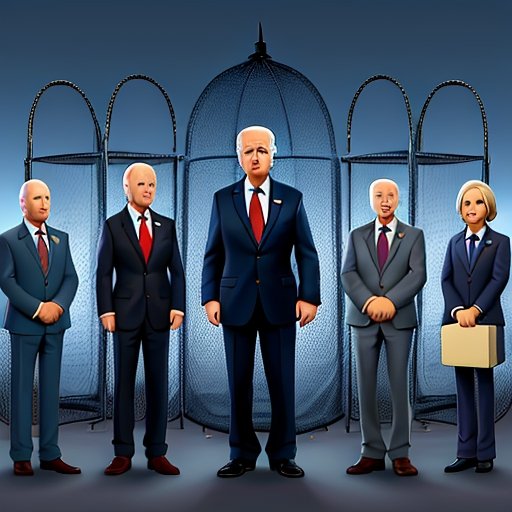You know, Kamala Harris has done something that many politicians do—she’s changed her mind. She’s walked back on a bunch of things over the years, like fracking, Medicare for all, gun control and other key issues. And, hey, changing your stance isn’t always a bad thing. Politicians are human, after all, and humans evolve, especially when you’re in the public eye for as long as someone like Harris. It’s almost expected. But here’s the problem: she’s not just changing her mind on some policy here or there. Kamala is now proposing something that could have serious consequences for the country, and it’s something we can’t afford to overlook with an election right around the corner.
In a recent announcement, she made it crystal clear: she wants to get rid of the filibuster, specifically for legislation like Roe v. Wade. Kamala said, “I’ve been very clear, I think we should eliminate the filibuster for Roe, and get us to the point where 51 votes would be what we need to actually put back in law…” Hold it! This isn’t some small tweak to policy. This is a big deal. And it’s not just Republicans raising an eyebrow here; it’s independents and even some Democrats. People are starting to wake up to how radical this position is, and for good reason.
Let’s take a look at what the filibuster actually is, where it came from, and why tossing it out the window could be a real problem for democracy in America.
What is a Filibuster, Anyway?
If you’ve ever heard the term “filibuster” and thought it sounded like something from a Western movie, you’re not far off. It’s an old-school term for a long-winded debate tactic. A filibuster is when one or more senators stand up and talk—sometimes for hours or even days— to block a vote on a bill. The idea is simple: it forces the majority party to either negotiate with the minority or abandon the legislation altogether.
The filibuster has roots way back in the early days of the Senate. The folks who designed our government were worried about a simple majority running the show, so they set up the Senate as a place where things could slow down, and where the minority had a voice. And to this day, the filibuster is one of the main tools that lets the minority party keep legislation from passing if they don’t like what’s on the table.
In more modern times, the filibuster works a bit differently. Nowadays, you don’t have to physically stand there and talk for hours like some marathon monologue. What matters is that you need 60 votes to break a filibuster and bring a bill to a vote. That’s where the filibuster gets its power. It forces the Senate to find some kind of bipartisan support for most legislation. Without 60 votes, nothing happens.
Now, if you’re thinking, “Why should we care about some Senate procedure from the old days?”—well, because the filibuster does something important: it makes sure that whatever laws are passed have some level of consensus. It stops one party from completely steamrolling the other, and that’s a big deal for a country as divided as ours is right now.
Key Points About the Filibuster
- Promotes consensus-building in Congress
- Prevents hasty legislation
- Ensures minority voices are heard
- Maintains stability in governance
- Encourages bipartisan cooperation
Why Kamala’s Plan is a Problem
Kamala Harris wants to get rid of the filibuster so the Senate can pass certain laws with just 51 votes. On the surface, that might seem like a quicker, easier way to get things done. You don’t have to deal with all the political back-and-forth, right? Well, hold on. That’s exactly the point of the filibuster—it’s supposed to slow things down so that laws aren’t passed on a whim. It forces compromise, and when you take that away, you’re opening the door to some dangerous possibilities.
Think about it. If you eliminate the filibuster, every election becomes a ticking time bomb. One party takes control of the Senate, they pass a bunch of laws. Then the next election comes, the other party gets control, and they undo everything the first group did. It would be like hitting a giant reset button every few years, and that kind of political whiplash is not good for anyone.
But it’s not just about political swings. The bigger issue is that eliminating the filibuster makes it much easier for a single party to push through their entire agenda without even having to listen to the other side. That’s not democracy—that’s a dictatorship by majority. And if you think that only matters when “the other guy” is in charge, think again. The pendulum swings both ways.
The Importance of Stability
At the heart of this whole issue is a fundamental misunderstanding of what democracy is. America is not a straight-up majority-rule democracy. We’re a republic, which means that the system is set up to protect the minority from being completely drowned out by the majority. The filibuster is one of those protections. It gives the minority party a way to slow things down, to have their voices heard, and to keep the majority in check.
If we get rid of the filibuster, we’re essentially removing that safeguard. Laws will pass with the slimmest of majorities, and that means they’ll reflect the will of a very narrow group of people, rather than a broad consensus. That’s not good for democracy, and it’s definitely not good for a country as diverse as ours.
Protecting Minority Rights
The U.S. system of government is designed not just to reflect the will of the majority but also to protect minority rights. The filibuster is an essential part of this system, ensuring that all voices are heard in the legislative process. Without it, there’s a risk that laws could change dramatically with each shift in political power, leading to uncertainty and instability.
Impact of Removing the Filibuster
Eliminating the filibuster could lead to:
- Rapid policy changes with each new administration
- Reduced protection for minority viewpoints
- Decreased stability in long-term governance
- Potential erosion of checks and balances
Conclusion: Tread Carefully
Look, I get it. Kamala Harris and her supporters think getting rid of the filibuster will make it easier to pass the laws they care about. But the problem is, once you take that step, there’s no going back. And the consequences could be huge.
Kamala’s changing positions on various issues might have been easy to brush off in the past. But this? This is different. She’s not just evolving her views; she’s advocating for a fundamental change to the way our government works. And that’s something we need to take seriously.
The filibuster may seem like a relic of the past, but it’s a crucial part of our democratic process. Without it, we risk turning the Senate into a place where the majority party rules with an iron fist, silencing millions of Americans in the process. That’s not the kind of democracy I think most of us want.
So, as we head into the next election, let’s be clear-eyed about what’s at stake here. Kamala’s plan might seem like a shortcut to passing important legislation, but it’s a shortcut that could lead us down a very dangerous road. And once we’re on it, there’s no easy way to turn back.






